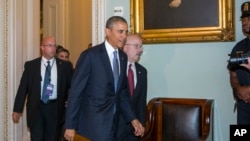CAPITOL HILL —
Hours before U.S. President Barack Obama was to address the nation on the need to confront Syria’s use of chemical weapons, he met with senators of both major political parties on Capitol Hill. Lawmakers emerged saying a vote authorizing the use of force against Syria is unlikely for now, and any final resolution will take international diplomatic developments into account.
President Obama had little to say after meeting separately with Democratic and Republican senators.
“It was a good conversation. Thank you very much," said President Obama.
Late Monday, Senate Majority Leader Harry Reid postponed a vote on a resolution authorizing the use of force against Syria - a measure approved last week by the Senate Foreign Relations Committee. The committee’s top Republican, Senator Bob Corker, helped craft the resolution, but now says it is on hold pending a Russian proposal for Syria to hand over its chemical weapons.
“I would be very surprised to see any vote on the Senate floor in the short term. I think our best course of action is to pause, to understand whether this [Russian proposal] is credible or not," said Corker.
Democratic Senator Richard Durbin said President Obama is not overly optimistic that diplomacy can end the Syrian crisis, but is willing to pursue non-military avenues.
“What he has basically asked is for some time to work this out - a matter of days, into next week. And I think that is reasonable," said Durbin.
Majority Leader Reid decides what measures are brought to the Senate floor and when.
“It is important we do this well, not quickly. If something can be done diplomatically, I am totally satisfied with that," said Reid.
The wait-and-see approach constitutes a dramatic shift from last week, when the Obama administration and some of its allies on Capitol Hill warned of grave consequences if Congress failed to promptly authorize military strikes against Syria. Since then, a growing number of lawmakers of both parties have gone on record opposing the use of force.
A small group of senators has proposed an alternative resolution that does not rule out military action, but gives 45 days for Syria to hand over chemical weapons.
Elsewhere on Capitol Hill, Defense Secretary Chuck Hagel told a House panel that “for this diplomatic option to have a chance at succeeding, the credible, real threat of U.S. military action must continue.''
Senator Corker agreed.
“The authorization of military force absolutely needs to remain on the table. Otherwise I do not think these negotiations will go anywhere," he said.
Polls show Americans overwhelmingly oppose military intervention in Syria, a fact that has weighed heavily on congressional deliberations to date.
President Obama had little to say after meeting separately with Democratic and Republican senators.
“It was a good conversation. Thank you very much," said President Obama.
Late Monday, Senate Majority Leader Harry Reid postponed a vote on a resolution authorizing the use of force against Syria - a measure approved last week by the Senate Foreign Relations Committee. The committee’s top Republican, Senator Bob Corker, helped craft the resolution, but now says it is on hold pending a Russian proposal for Syria to hand over its chemical weapons.
“I would be very surprised to see any vote on the Senate floor in the short term. I think our best course of action is to pause, to understand whether this [Russian proposal] is credible or not," said Corker.
Democratic Senator Richard Durbin said President Obama is not overly optimistic that diplomacy can end the Syrian crisis, but is willing to pursue non-military avenues.
“What he has basically asked is for some time to work this out - a matter of days, into next week. And I think that is reasonable," said Durbin.
Majority Leader Reid decides what measures are brought to the Senate floor and when.
“It is important we do this well, not quickly. If something can be done diplomatically, I am totally satisfied with that," said Reid.
The wait-and-see approach constitutes a dramatic shift from last week, when the Obama administration and some of its allies on Capitol Hill warned of grave consequences if Congress failed to promptly authorize military strikes against Syria. Since then, a growing number of lawmakers of both parties have gone on record opposing the use of force.
A small group of senators has proposed an alternative resolution that does not rule out military action, but gives 45 days for Syria to hand over chemical weapons.
Elsewhere on Capitol Hill, Defense Secretary Chuck Hagel told a House panel that “for this diplomatic option to have a chance at succeeding, the credible, real threat of U.S. military action must continue.''
Senator Corker agreed.
“The authorization of military force absolutely needs to remain on the table. Otherwise I do not think these negotiations will go anywhere," he said.
Polls show Americans overwhelmingly oppose military intervention in Syria, a fact that has weighed heavily on congressional deliberations to date.




